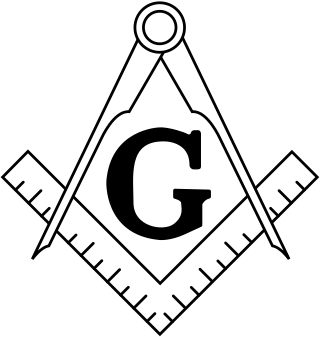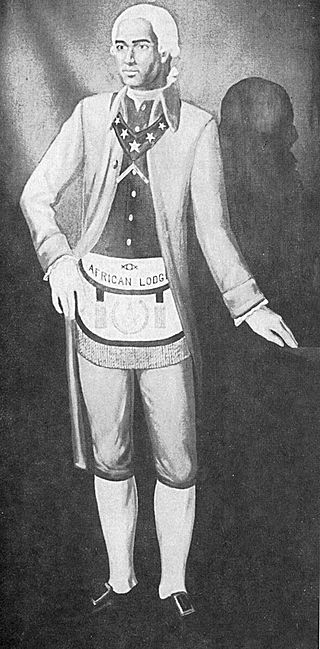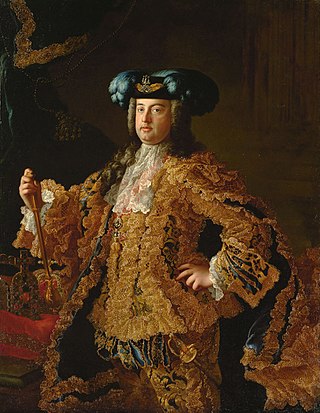African Lodge, No. 459 was the founding lodge of Prince Hall Freemasonry. It is the lodge from which all modern Prince Hall Lodges trace their descent.
| Part of a series on |
| Freemasonry |
|---|
 |
African Lodge, No. 459 was the founding lodge of Prince Hall Freemasonry. It is the lodge from which all modern Prince Hall Lodges trace their descent.
Prior to the American Revolutionary War, Prince Hall and fourteen other free black men petitioned for admittance to the (at that time all white) Boston St. John’s Lodge. They were turned down. [1] [2] [3] Having been rejected by colonial Freemasonry, they petitioned to join a Masonic lodge attached to the 38th British Foot Infantry (then meeting at Castle William Island in Boston Harbor, Massachusetts) which operated under a charter from the Grand Lodge of Ireland. [4] [5]
They were accepted, becoming the first black men to be initiated into a Masonic Lodge in America. [4] The regiment left Boston shortly after the start of the American Revolution, taking its lodge with it. Prince Hall and his associates received a "permit" from the Grand Lodge of Ireland to meet for the purpose of Masonic funeral services and processions. Under this permit, African Lodge was organized on July 3, 1776. Prince Hall was elected Worshipful Master. This permit, however, was limited. It did not allow them to do any "masonic work" or to take in any new members. [6]
Hall then applied to the Grand Lodge of England for a more complete warrant (or charter). This request was granted on September 29, 1784, when H. R. H. The Duke of Cumberland, the Grand Master of the Premier Grand Lodge of England, issued a charter for "The African Lodge No. 1" (later renamed African Lodge No. 459. [7]
With a charter, African Lodge #459 could initiate more men from the free black community in Boston. In 1797 Prince Hall organized subsidiary lodges in Philadelphia, Pennsylvania, and Providence, Rhode Island. These operated under the charter of African Lodge (and initially were also given the name "African Lodge" and the number 459. The Lodge in Providence soon changed its name to Hiram Lodge #3). In December 1808, these three lodges met and formed the African Grand Lodge (sometime referred to as African Grand Lodge #1) and elected Prince Hall as Grand Master. In 1847, the African Grand Lodge changed its name to the Prince Hall Grand Lodge, in honor of their founding Grand Master. Other Prince Hall Grand Lodges were formed in other states, and today there are 47 Prince Hall Grand Lodges who trace their lineage to the original African Lodge. [8] [9]

Freemasonry or Masonry refers to fraternal organisations that trace their origins to the local guilds of stonemasons that, from the end of the 14th century, regulated the qualifications of stonemasons and their interaction with authorities and clients. Many Freemasons trace the roots of the craft further back in history, accepting the Knights Templar as the conduit between the ancient mysteries and the beginnings of operative and speculative Freemasonry. Modern Freemasonry broadly consists of two main recognition groups: Regular Freemasonry, which insists that a volume of scripture be open in a working lodge, that every member professes belief in a Supreme Being, that no women be admitted, and that the discussion of religion and politics do not take place within the lodge; and Continental Freemasonry, which consists of the jurisdictions that have removed some, or all, of these restrictions.
The history of Freemasonry encompasses the origins, evolution and defining events of the fraternal organisation known as Freemasonry. It covers three phases. Firstly, the emergence of organised lodges of operative masons during the Middle Ages, then the admission of lay members as "accepted" or "speculative" masons, and finally the evolution of purely speculative lodges, and the emergence of Grand Lodges to govern them. The watershed in this process is generally taken to be the formation of the first Grand Lodge in London in 1717. The two difficulties facing historians are the paucity of written material, even down to the 19th century, and the misinformation generated by masons and non-masons alike from the earliest years.
In Freemasonry, regularity is one of the factors by which individual Grand Lodges judge whether to recognise one another for the purposes of allowing formal interaction at the Grand Lodge level and visitation by members of other jurisdictions. Each individual Grand Lodge determines which other Grand Lodges it considers Regular.

Prince Hall was an American abolitionist and leader in the free black community in Boston. He founded Prince Hall Freemasonry and lobbied for education rights for African American children. He was also active in the back-to-Africa movement.
Prince Hall Freemasonry is a branch of North American Freemasonry for African Americans founded by Prince Hall on September 29, 1784. There are two main branches of Prince Hall Freemasonry: the independent State Prince Hall Grand Lodges, most of which are recognized by State grand lodges, and those under the jurisdiction of the National Grand Lodge. Prince Hall Freemasonry is the oldest and largest predominantly African-American fraternity in the United States.
Co-Freemasonry is a form of Freemasonry which admits both men and women. It began in France in the 1890s with the forming of Le Droit Humain, and is now an international movement represented by several Co-Freemasonic administrations throughout the world. Most male-only Masonic Lodges do not recognise Co-Freemasonry, holding it to be irregular.

The Most Worshipful Grand Lodge of Ancient Free and Accepted Masons of the Commonwealth of Massachusetts, commonly referred to as the Grand Lodge of Massachusetts and abbreviated GLMA, is the main governing body of Freemasonry within Massachusetts, and maintains Lodges in other jurisdictions overseas, namely Panama, Chile, the People's Republic of China, and Guantanamo Bay Naval Base, Cuba.

Kwaku Walker Lewis, was an early African-American abolitionist, Freemason, and Mormon elder from Massachusetts. He was an active member of the Underground Railroad and the anti-slavery movement.

This is a chronology of the formation of "regular" or "mainstream" Masonic Grand Lodges in North America, descending from the Premier Grand Lodge of England or its rival, the Antient Grand Lodge of England. A Grand Lodge is the governing body that supervises "Craft" Freemasonry in a particular jurisdiction or geographical area.

The Grand Lodge of Free & Accepted Masons of Indiana is one of two statewide organizations that oversee Masonic lodges in the state of Indiana. It was established on January 13, 1818. The Grand Lodge of Indiana's offices and archives are located in the Indianapolis Masonic Temple. The historically black Most Worshipful Prince Hall Grand Lodge of Indiana F&AM is the second regular Masonic grand lodge in the state, and it was originally established in 1856 as the Independent Union Grand Lodge of Free and Accepted Masons of the State of Indiana. The two grand lodges agreed to mutual recognition in May 1998, and they jointly share sovereignty over the Masonic fraternity in Indiana.

The Grand Lodge of Ohio, formally known as the Grand Lodge of Free & Accepted Masons of Ohio, is the governing body of the largest group of Masonic lodges in Ohio. The Grand Lodge of Ohio follows the Anglo-American tradition of Freemasonry that is common in the United States. In 2023, the Grand Lodge reported a total membership of 75,000 Master Masons.
The Sons of Haiti is a Haitian-American Masonic Grand Lodge and fraternal organization with headquarters in Renton, Washington.

The Iowa Masonic Library and Museum, located in Cedar Rapids, Iowa, United States, is one of the largest Masonic libraries in the world and incorporates at least three museum collections. The library was the first, worldwide, to have its own building, which was constructed in 1884. Its current building, constructed in 1955, also houses the administrative offices for the Grand Lodge of Iowa, one of the governing bodies for Freemasonry in Iowa.
The Most Worshipful National Grand Lodge Free & Accepted Ancient York Masons Prince Hall Origin National Compact USA is a body of Masonry in the United States of America composed predominantly of African American Freemasons. It governs Grand Lodges within the United States and the Commonwealth of The Bahamas.

John Telemachus Hilton was an African-American abolitionist, author, and businessman, who established barber, furniture dealer, and employment agency businesses. He was a Prince Hall Mason and established the Prince Hall National Grand Lodge of North America and served as its first National Grand Master for ten years. He also was a founding member of the Massachusetts General Colored Association, and active member and author in the Anti-Slavery movement.
The Grand Lodge of New Jersey Free & Accepted Masons is the official governing body of New Jersey Masonic Lodges as recognized by other Grand Jurisdictions throughout the world. As early as 1730, New Jersey was one of the first states with active Freemasonry. The Grand Lodge of NJ was formally established in 1787. The Most Worshipful Prince Hall Grand Lodge of State of New Jersey and The Most Worshipful Grand Lodge of New Jersey recognize each other as Masonic Grand Lodges.
The Most Worshipful Smooth Ashlar Grand Lodge F&AAYM is a subordinate Masonic Grand Lodge of the Most Worshipful National Grand Lodge of Free and Accepted Ancient York Masons Prince Hall Origin - National Compact in and for the State of Georgia. Through it subordination to the National Grand Lodge, Smooth Ashlar Grand Lodge has lineage to African Lodge No. 459.

In Freemasonry, a Mason at sight, or Mason on sight, is a non-Mason who has been initiated into Freemasonry and raised to the degree of Master Mason through a special application of the power of a Grand Master.
Freemasonry in the United States is the history of Freemasonry as it was introduced from Britain and continues as a major secret society to the present day. It is a fraternal order that brings men together to gain friendship and opportunity for advancement and community progress. It has been nonpolitical except for a period around 1820 when it came under heavy attack in the Northeast. That attack reduced membership, but it recovered and grew after 1850. Growth ended in the late 20th century and membership has declined.